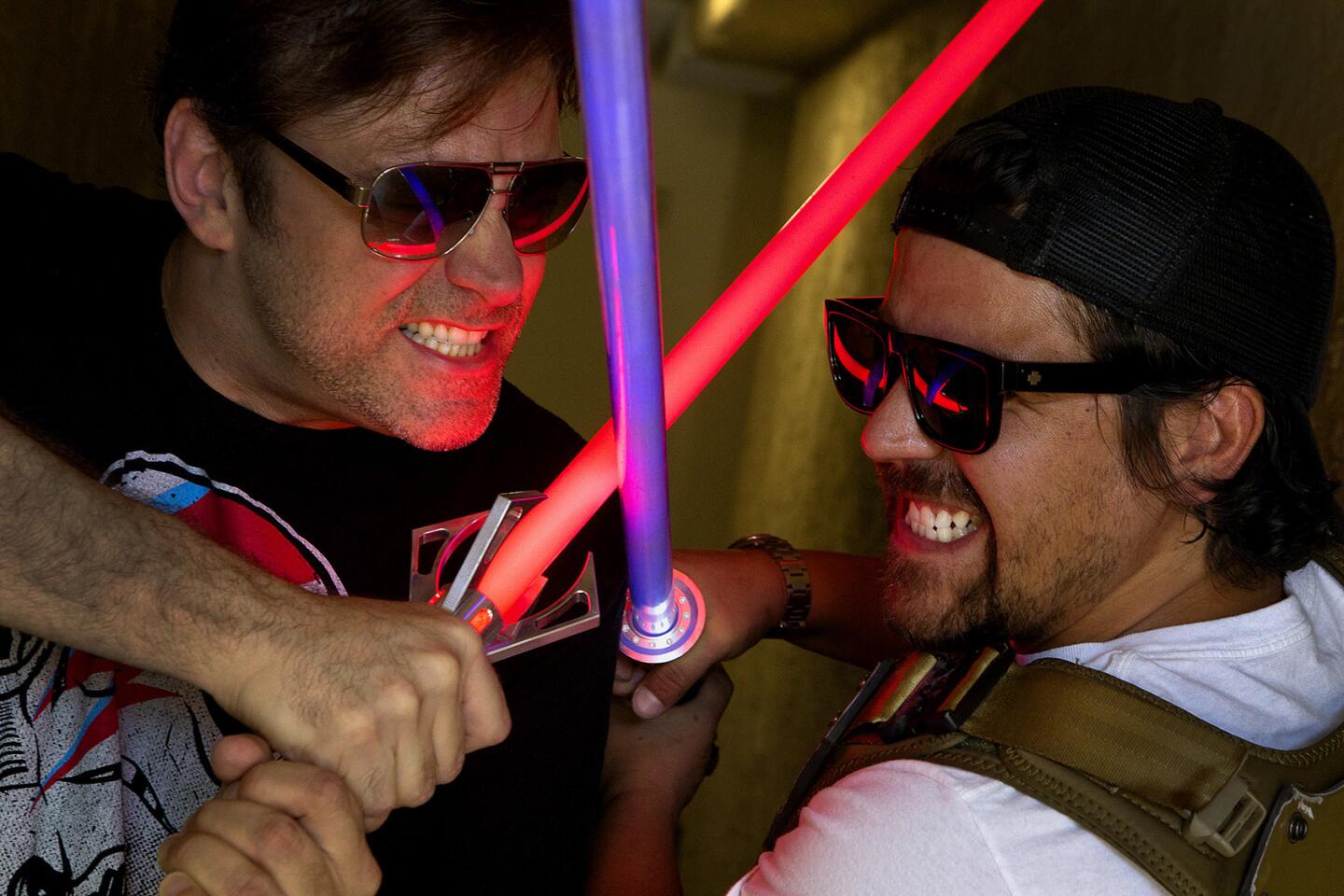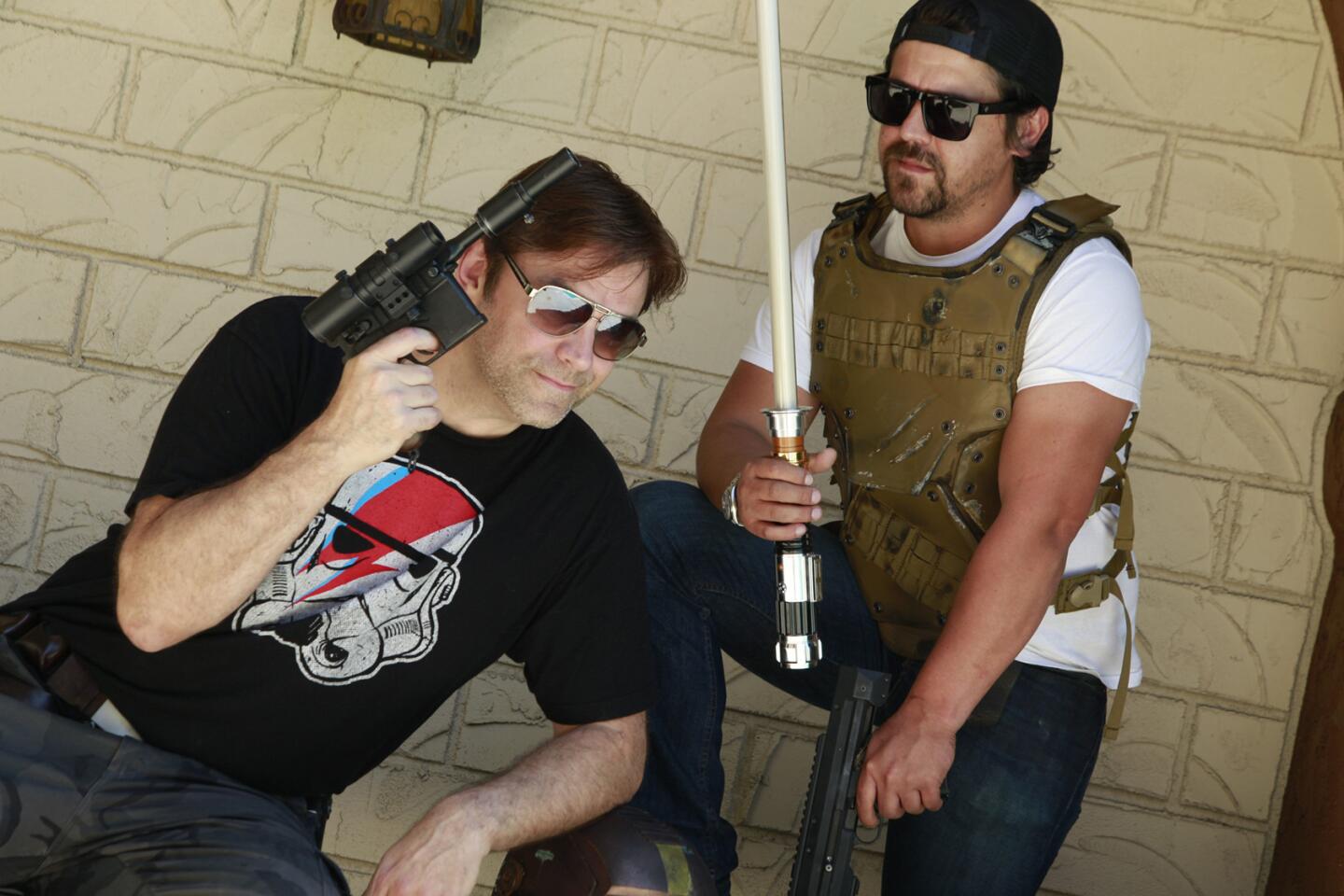Inside the increasingly competitive world of fan filmmaking: Will $1 million budgets ruin the fun?
In early April, two longtime friends, Jeffrey Henderson and Nick Finch, went out to the sand dunes of Glamis, Calif. — a barren landscape that, three decades ago, stood in for the desert planet Tatooine in “Return of the Jedi” — to shoot a “Star Wars” fan film called “The Sable Corsair.”
With a crowd-funded budget of less than $10,000 for the short film — about a group of smugglers who crash-land on a desert planet while on the run from the Empire — creature comforts for the cast and crew of roughly 60 people were few. A day and a half out of the three-day shoot were lost to transportation snafus and a sandstorm.
But, as in every good “Star Wars” story, the heroes persevered. Finch and Henderson entered “The Sable Corsair” into Lucasfilm’s official Star Wars fan film contest, and on Sunday they were awarded the Audience Choice prize at the Star Wars Celebration convention in London.
For years, studios have generally tolerated and even encouraged short fan films like “The Sable Corsair” as long as they don’t attempt to capitalize financially on copyrighted material.
Recently, however, with the advent of crowd funding and the spread of inexpensive tools to create digital effects, fan films have grown in sophistication — to the extent that the very definition of what a fan film is has started to blur.
To try to halt the arms race among some larger fan-made productions, studios now find themselves in the rather awkward position of deploying lawyers to protect their most valuable intellectual property from its most hardcore fans.
Late last year, CBS and Paramount Pictures filed a copyright infringement lawsuit against the makers of a fan film called “Star Trek: Axanar,” who had raised more than $1.2 million through a crowd-funding campaign for what they billed as “the first fully professional, independent ‘Star Trek’ film.”
Today’s pop culture acolytes have more ways than ever to express their fandom, as evidenced by the throngs who will once again make the pilgrimage this week to the Comic-Con International fan expo in San Diego. But for many diehard aficionados, whether you’re talking about “Star Wars” or “Star Trek,” “Game of Thrones” or “The Lord of the Rings,” comic book movies or slasher flicks, nothing gets closer to the source than the act of making a fan film.
“In some small way, I’ve become part of this thing that was so defining, that I love so much,” Henderson, the 46-year-old storyboard artist and voiceover actor behind “The Sable Corsair,” said on a recent afternoon at his apartment in the San Fernando Valley. “It was like Adolescent Wish Fulfillment 101. I mean, we had 14 dudes show up dressed as Stormtroopers!”
Since the modern fan film movement kicked off with the 1997 short “TROOPS,” a parody of TV’s “COPS” with Stormtroopers, fan films have largely been modest, homemade affairs shared among fellow obsessives well below the mainstream radar.
“The studios put up with this because they don’t want to alienate the fan base,” said Christine Cuddy, a partner at the entertainment law firm Kleinberg Lange Cuddy & Carlo. “These fans can be very active on the Internet.”
Boundary-pushing fan films like “Star Trek: Axanar,” however, have changed the equation.
“There’s a lot of talk online about: ‘What is a fan film?’ ” said Robert Meyer Burnett, who is set to direct “Axanar” if it ever gets made. “A lot of people are saying, ‘Well, a fan film needs to be made in your parents’ basement by a bunch of friends.’ I don’t know where that notion even comes from. As technology has gotten exponentially better, if you’re clever and you employ real production methodologies, you can make something to rival what you see in television and the movies. But the difference will always be that what fan filmmakers are doing is given away for free.”
Although some see “Axanar” as a David-and-Goliath battle for a form of creative expression that should be protected under fair use, others regard it as a legally questionable overreach that threatens the entire world of fan films.
“If you make a fan film that’s $1 million, by definition it’s not a fan film,” Henderson said flatly. “OK, five or 10 grand — that’s fine. But once you start stepping on the toes of stuff that they spend hundreds of millions of dollars to make, no reasonable person could think they’re not going to shut you down.”
The fact is, no matter how much your fan film costs, the holder of the copyright can take you to court at any time if they feel you’ve stepped over the line.
“If you’re saying it’s fair use, you have to comply with the fair use rules, and it’s always gray,” Cuddy said. “There’s no black line. People always want to know, ‘Can I do this?’ And you go, ‘Well, there’s a risk.’ ”
Even so, J.J. Abrams, who directed “Star Wars: The Force Awakens” and appeared in a video announcing this year’s “Star Wars” Fan Film Awards, has expressed support for fan-made projects. At a promotional fan event in May for the upcoming “Star Trek Beyond,” which Abrams produced, he argued that litigation “was not an appropriate way to deal with the fans.” A few weeks later, CBS and Paramount issued new guidelines directed at those looking to create their own “Star Trek”-inspired works. For now, though, the “Axanar” lawsuit remains unresolved.
In a statement accompanying their new “Star Trek” guidelines, CBS and Paramount said that they want to “encourage celebrations of this beloved cultural phenomenon.”
Some fan filmmakers argue that rules such as these inevitably stifle creativity. But Finch, who co-directed “The Sable Corsair” with Henderson, thinks Lucasfilm is wise to encourage fan filmmakers to play around in the “Star Wars” sandbox — within limits and on their terms. (According to the official rules of the Star Wars fan film contest, entries couldn’t be longer than five minutes, could use only Lucasfilm-supplied sound effects and music cues and had to “avoid bad language, rude gestures and other inappropriate stuff.”)
“It’s great in my opinion that the ‘Star Wars’ family is embracing these fan films,” said Finch, a 33-year-old actor. “You’re never going to be able to put a gag in the mouths of the fans. So you might as well embrace it and give people the tools to showcase your brand. You never know — you could have someone who does one of these fan films that blows people away go on to direct the next ‘Star Trek’ or ‘Star Wars’ movie.”
Indeed, a well-made fan film can become an attention-grabbing calling card. “TROOPS” writer-director Kevin Rubio has parlayed the success of that short into a career writing and directing for TV. Creature designer and filmmaker Sandy Collora made a mash-up of “Dark Knight,” “Alien” and “Predator” into a fan film called “Batman: Dead End.” The film debuted at Comic-Con in 2003 and became a viral hit; he is now developing an independent sci-fi/horror feature, for which he has raised nearly $100,000 on Kickstarter.
For both fans and studios alike, things were much simpler back in 1982, when a pair of 12-year-old kids in Mississippi named Chris Strompolos and Eric Zala set out to make a shot-for-shot re-creation of their favorite movie, “Raiders of the Lost Ark.” Their seven-year DIY odyssey has since passed into fan film legend and is chronicled in the new documentary “Raiders!”
“Our primary intention was just to have fun and role play,” said Strompolos. “It wasn’t to make money or sell it or do anything with it. We were just doing it for ourselves in a vacuum without any sort of guidance, teaching ourselves from an organic place. There was a purity to it that people really gravitate towards.”
Though he wouldn’t mind seeing the recognition for “The Sable Corsair” open up a few doors in his career, Henderson says the film ultimately came out of a similar place of love.
“No matter what happens from this point forward, I got to make a ‘Star Wars’ movie with my best friends, with real Stormtroopers and Boba Fett, where they made ‘Return of the Jedi,’ ” he said. “I win.”
MORE ENTERTAINMENT NEWS
Garry Marshall, endlessly hip, delivered mainstream comedy with an offbeat edge
Milo Yiannopoulos says his ‘Ghostbusters’-related Twitter ban is ‘the most gigantic possible gift’
Roger Ailes appears close to departing Fox News
More to Read
Only good movies
Get the Indie Focus newsletter, Mark Olsen's weekly guide to the world of cinema.
You may occasionally receive promotional content from the Los Angeles Times.









